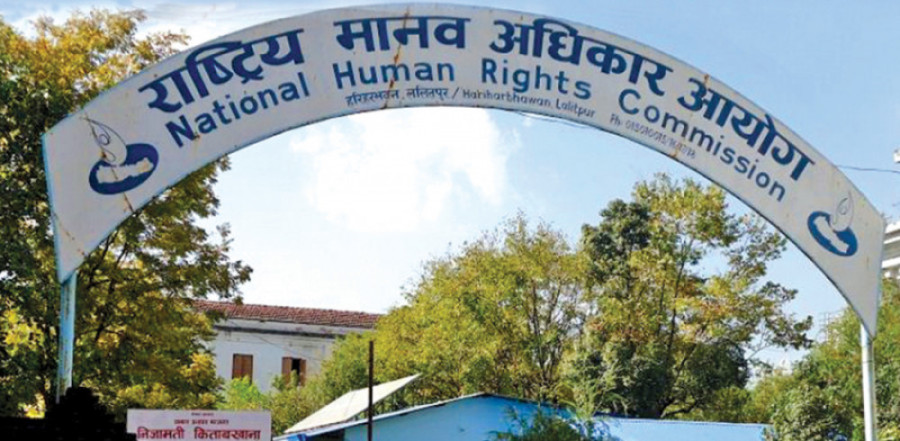National
Dispute over secretary appointment divides Human Rights Commission
As an international team assesses commission's performance, calls grow for an executive decision to end the controversy.
Binod Ghimire
The dispute over secretary selection continues to affect the National Human Rights Commission’s functioning at a time when a United Nations-supported team is here for its capacity assessment.
Based on the scores given by a three-member selection committee led by its member Surya Dhungel, four of the five commissioners, including chief commissioner Top Bahadur Magar, on October 30 recommended the government promote Murari Kharel to a secretary. Kharel is an acting secretary at the commission.
The Dhungel-led committee had provided equal marks to Kharel and Yagya Adhikari, a joint secretary at the commission. But Kharel was recommended for the position citing better performance during an interview and a presentation. Mihir Thakur, a commissioner, had objected to the decision.
Three days later, on November 3, he wrote a separate letter to Prime Minister Pushpa Kamal Dahal, asking him to refrain from appointing Kharel as the secretary, accusing him of misusing resources and engaging in irregularities at the commission. Furthermore, he took to Facebook on Sunday, saying that Kharel needs to be sacked because he had protected an official accused of sexual harassment.
He has been claiming that as Kharel and Adhikari got equal marks, Adhikari should get the position, given Kharel’s involvement in controversies.
Adhikari and Tikaram Pokharel, another contender for the position, also wrote to the Prime Minister’s Office on November 6, raising questions over the selection. As a result, the Dahal administration sought the original marking files of the three candidates. The commission, however, provided only the marks each candidate obtained and a copy of the minutes that recommended Kharel for the position.
The Prime Minister’s Office again wrote to the commission seeking the document. “We had to write a second letter seeking the proper documents,” Lila Devi Gadtaula, secretary at the Prime Minister’s Office, told the Post. “We received some documents a few days ago but I am not sure if we got what we were looking for.”
She said the commission’s reluctance to provide the documents is why the appointment process has been delayed for months.
The commission’s leadership says the government’s job is to implement their recommendation or request for a review if there are valid reasons. Chief commissioner Magar said they picked Kharel on merit.
“We have furnished documents necessary to justify our recommendation. I don’t think a constitutional commission should provide all the secret documents to the executive,” he told the Post. The commission hasn’t yet provided the original files of the marking done in the selection process.
Adhikari and Pokharel have accused that Kharel was “favoured” in the interview process. “The appointment process must be transparent and credible,” Adhikari told the Post. “Why keep the marking files secret while so many questions have been raised over the recommendation?” He said the Prime Minister’s Office wouldn't have sought original documents if the recommendation was fair.
Kharel said the commission recommended him based on the results from the selection committee that had Kashi Raj Dahal, former chief of the Administrative Court, and professor Kusum Shakya as members. “It is the commission’s responsibility to take up the matter. I don’t have anything to say,” he said. Kharel has been working as an acting secretary for more than two years now.
Some officials at the commission, including Thakur, claim that it is against the prevailing law to designate an official the acting secretary for more than six months.
The commission’s law doesn’t say anything as to how long an official can serve as the acting secretary but the Civil Service Act puts a six-month cap.
The dissident officials have complained about the “controversial appointment” before the assessment team as well. A five-member team constituted by the Asia Pacific Forum, an alliance of human rights institutions from the Asia Pacific region, is carrying out the capacity assessment of the commission with support from the United Nations Development Programme and the Office of the High Commissioner for Human Rights. The team led by Pip Dargan, principal adviser of the forum’s leadership services, is in Nepal for the assessment. Other than visiting the commission's central and provincial offices and interviewing officials, the team also has met with civil society members.
Preliminary findings of the assessment that started on February 26 are scheduled to be presented before the commission on Sunday. The assessment, according to the forum, is to provide an analysis of the current strengths and capacity gaps of the commission and recommend strategic priorities and actions to support it to fulfil its human rights mandate in line with the Paris Principles.
Lily Thapa, a commissioner at the human rights watchdog, said the delayed appointment hasn’t just affected the administrative performance but also dragged the commission into a controversy. “I believe the Prime Minister’s Office will not prolong the matter further but take a proper decision to end the controversy,” she told the Post.




 18.12°C Kathmandu
18.12°C Kathmandu














